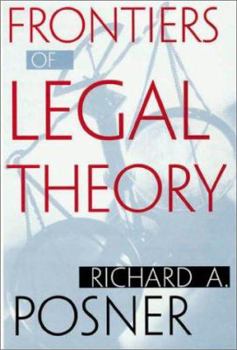Frontiers of Legal Theory
Select Format
Select Condition 
Book Overview
The most exciting development in legal thinking since World War II has been the growth of interdisciplinary legal studies - the application of the social sciences and the humanities to law in the hope of making law less formalistic, more practical, and better grounded empirically, bettered tailored to social goals. This book examines five principal areas or directions of interdisciplinary study: economics, history, psychology, the epistemology of law (that is, how law finds facts), and the empirical study of law. These approaches are seen to interpenetrate and to compose a coherent body of legal theory - a unified framework for understanding such seemingly disparate phenomena as the economics of free speech, the intellectual history of economic analysis of law, the relation between income and liberty, the law of possession, the psychology of legal decision-making, the role of emotion in law, and the use of citation analysis to evaluate judges and law professors.
Format:Hardcover
Language:English
ISBN:067400485X
ISBN13:9780674004856
Release Date:June 2001
Publisher:Harvard University Press
Length:453 Pages
Weight:1.94 lbs.
Dimensions:1.6" x 6.5" x 9.6"
Related Subjects
Education & Reference Jurisprudence Law Legal History Legal Theory & Systems Philosophy TextbooksCustomer Reviews
1 rating
Great book !
Published by Thriftbooks.com User , 22 years ago
Too often it seems that law is limited to the "good old boys" network that largely is content to go to law school, graduate, speak only to lawyers and clients and die. Outside fields are rarely considered. "Who cares if a policy is economically inefficient?" "Why should that frustrate 'democracy'".Posner is the first I know of among solid legal scholars to explore the connections between law and related disciplines. His works are not introductory, most seem overly technical. While this is good in highlighting the seriousness of his efforts and pushing the "Frontiers of Legal Theory", it has not led to stellar general interest. I can only hope that some will take his ideas and make them more digestible for a public audience.





